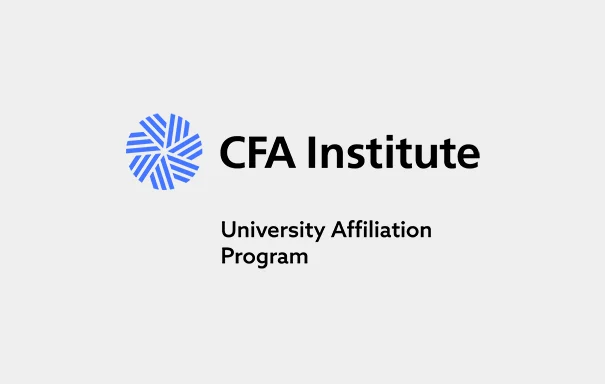

The program offers two distinct pathways for students to tailor their educational experience based on their prior educational preparation: the Traditional Pathway (for those aspiring to earn the Chartered Financial Analyst® (CFA®) designation in the future) and the CFA Charterholder Pathway (for those that already hold the CFA Charter or who have successfully passed all three levels of the CFA exam). Learn More

Graduates should be able to:
Know: Identify appropriate tools, techniques, and fiduciary responsibilities used in financial analysis in complex situations for firms and institutional and individual clients.
Apply: Apply accounting, economic, and quantitative methods and analyses in financial analysis used in various client-based scenarios and situations.
Relate: Relate the practice of portfolio management according to ethical standards.
Critical Analysis and Evaluation: Synthesize a sophisticated level of critical evaluation and analysis to financial analysis scenarios and apply advanced techniques in security analysis, asset allocation, and portfolio management for a firm and/or client.
Communicate: Prepare comprehensive written reports and effective presentations of financial analysis.
Professional Practice: Employ ethical and professional standards when making financial analysis and recommendations, abiding by regulatory and legal guidelines.
Lifelong Learning: Engage with the CFA Institute in being contemporary and adopting changes in the financial analysis industry, including related standards and regulations.
Discovery: Engage in learning and adopting new thinking in financial analysis including such areas as valuation, corporate performance, and portfolio management as it may apply to contributing to a firm and/or advising clients on complex financial analysis situations.
The program’s curriculum is based on the pathway in the MSFA program you are pursuing.
This pathway is part of the CFA Institute University Affiliation Program. It is recognized by CFA Institute as embedding at least 70% of the CFA Program Candidate Body of Knowledge™ (CBOK) from the CFA Program into our curricula.
Through a combination of theory and practice, students will study:
Economic analysis utilized in investment decision making
Financial statement analysis
Quantitative methods and analysis beneficial to financial analysis
The investment environment including financial markets, institutions, and the investing process
Corporate finance
Security analysis and valuation
Alternative investments, derivatives, and risk management
Advanced portfolio management
Professional standards and ethics in the investments industry
Ten (10) courses (30 credits) are required. If you hold a financial designation or license, or have successfully completed certain courses at the College for Financial Planning®—a Kaplan company, you may qualify for prior learning credit toward our Master of Science in Financial Analysis (MSFA) program.
Designed for students who have already earned the CFA Charter but would like to continue their education in financial analysis and investment management. The curriculum goes beyond topics included in the CFA Program, as well as deeper in some topics covered in the CFA Program.
CFA Charterholders are granted three (3) courses or nine (9) credit hours of credit for prior learning and can complete the CFA Charterholder Pathway and earn the masters degree by selecting and completing seven (7) elective courses for twenty-one (21) credit hours. Those who have completed all three levels of the CFA exam, but have not yet been conferred the CFA designation, may also apply for this pathway and be considered for credit for prior learning.
This pathway requires ten (10) courses with a total of thirty (30) credits, which include:
CFA Charterholders are granted three (3) courses or nine (9) credit hours of credit for prior learning and can complete the CFA Charterholder Pathway and earn the masters degree by selecting and completing seven (7) elective courses for twenty-one (21) credit hours. Those who have completed all three levels of the CFA exam, but have not yet been conferred the CFA designation, may also apply for this pathway and be considered for credit for prior learning.
Electives—Area A: Courses from Other Programs
Students may select approved elective courses from other disciplines, allowing them to broaden their learning, explore interdisciplinary interests, and tailor their academic experience to support their individual goals. Area A courses are offered through programs outside of Financial Analysis.
Students may select up to 9 credits in electives from Area A.
Electives—Area B: Courses from the Financial Analysis Program
Electives listed in Area B are designed to help students build practical skills in financial analysis and research.
Students may select up to 21 credits in electives from Area B.
CFA Charterholder Pathway:
Electives—Area A: Courses from Other Programs
CFA Charterholder Pathway:
Electives—Area B: Courses from Financial Analysis Program
CFA®, Chartered Financial Analyst®, and CFA Institute logo are registered trademarks owned by CFA Institute. CFA Institute is the administrator of the CFA Program and the grantor of the CFA designation.
CFA Institute: Kaplan Schweser is a CFA Institute Prep Provider. Only CFA Institute Prep Providers are permitted to make use of CFA Institute copyrighted materials, which are the building blocks of the exam. We are also required to update our materials every year and this is validated by CFA Institute.
Our products and services substantially cover the relevant curriculum and exam and this is validated by CFA Institute. In our advertising, any statement about the numbers of questions in our products and services relates to unique, original, proprietary questions. CFA Institute Prep Providers are forbidden from including CFA Institute official mock exam questions or any questions other than the end of reading questions within their products and services.
CFA Institute does not endorse, promote, review, or warrant the accuracy or quality of the product and services offered by Kaplan Schweser.
Demand for Financial Analysts: https://www.bls.gov/ooh/business-and-financial/financial-analysts.htm.
CAIA®: CAIAA does not endorse, promote, review, or warrant the accuracy of the products or services offered by Kaplan, Inc., nor does it endorse any pass rates claimed by the provider. CAIAA is not responsible for any fees or costs paid by the user to Kaplan, Inc., nor is CAIAA responsible for any fees or costs of any person or entity providing any services to Kaplan, Inc. CAIA®, CAIA Association®, Chartered Alternative Investment AnalystSM, and Chartered Alternative Investment Analyst Association® are service marks and trademarks owned by CHARTERED ALTERNATIVE INVESTMENT ANALYST ASSOCIATION, INC., a Massachusetts nonprofit corporation with its principle place of business at Amherst, Massachusetts, and are used by permission. Kaplan Schweser’s exam preparation products are not available to residents of countries or regions subject to technology or economic and/or trade sanctions by the Office of Foreign Assets (OFAC) or other authorities including Cuba, Iran, North Korea, Syria, or Ukraine (Crimea Region).
Not Finding What You're Looking For?